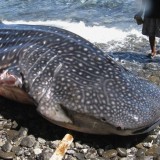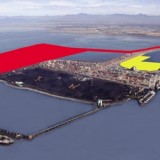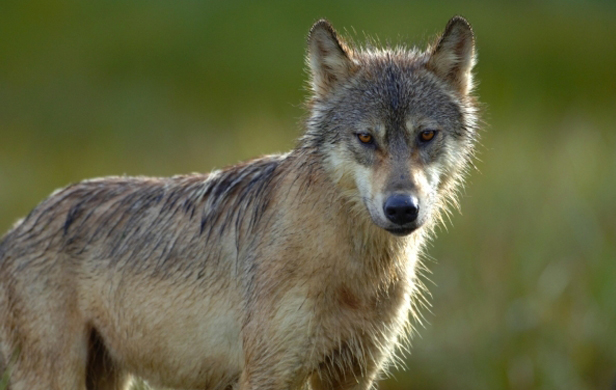Read this report from CBC.ca of new evidence showing East Coast cod stocks and surrounding ecosystems are beginning to recover following their dramatic collapse several decades ago. (July 27, 2011)
Tag Archives: species at risk
Suitcases of Cash Banned by International Whaling Commission
Read this report from ABC (Australia) news on the IWC’s approval of a ban on bringing suitcases of cash to negotiations, in an effort to curb the votes-for-cash corruption that has plagued the organization’s annual meetings. (July 14, 2011)

Rafe on Shark Fins and the NDP
I urge everyone to get a copy of the Vancouver Province for July 10 and read, in the A section, pp 8 and 9, a story about shark fins. It’s a tragic story and proves once again that corporations – who have no environmental concerns whatever – will log the last tree, dam the last river, and kill the last fish.
Mentioned prominently is my good friend Anthony Marr. Let me tell you a bit about this unrelenting fighter for animal rights.
Anthony Marr holds a science degree from the UBC and has worked as a field geophysicist and an environmental technologist. In 1995, he became a full time wildlife preservationist, which has brought him to India three times, earning him the title of the “Champion of the Bengal Tiger” in the Champions of the Wild TV series aired in 20 countries. As an anti-hunting activist, he has conducted high profile campaigns in Canada for the bears and seals, and been to Japan twice for the whales and dolphins. He is the founder of Heal Our Planet Earth (HOPE) and is currently on his fourth Compassion for Animals Road Expedition (CARE-4), covering 40 states. He is also the author of Omni-Science.
Before going on, 8 years ago Wendy and I were in Tahiti. We took a trip with half a dozen other tourists, by boat, to a lagoon, to see the “Spinner” dolphins. Our guide was a fish biologist.
When we got to the lagoon we were fortunate enough to see these remarkable creatures come out of the water and, as advertised, do a couple of full twists before hitting the water. It was probably the highlight of a wonderful trip.
Our guide asked us what we thought and we were fulsome in our delight. The guide then said, “Two years ago this pod was at about 100 and it’s now over 135 – good news, huh?”
Even though I smelt a rat, I nodded, with the others, in enthusiastic affirmation.
“Not so,” said our mentor. “The increase comes as a result of the killing of sharks.”
“The dolphins, at night, leave the lagoon, cross the reef to find food. Their only enemy is the shark. The sharks are all but gone because of fishermen catching the sharks, cutting off their fins and throwing them, still alive, back into the water. Because the sharks are gone, the dolphins have expanded in numbers at the expense of the entire ecosystem in this area.” (Quite apart from all else, what sort of person would de-fin a fish then send it back into the ocean? And what sort of person would buy the product?)
As you will see in the story, it is mostly Chinese people who buy them as a status symbol, demonstrating their success in life or, in the case of men, for assistance in achieving an erection. (Yes, I know all meat eaters eat the product of cruelty but here added to that cruelty is extinction of a hugely valuable species in oceans all over the world. In fact there are 49 species of sharks in BC waters and 1000 species world wide.)
Why should we care?
Because our part of the oceans is home to many species which are of critical importance to us, including 6 species of salmon, halibut, black cod, several species of rock fish and crustaceans such as shrimp and crab. These are all part of the ecology of the world’s oceans – as John Donne said, “No man is an island unto itself.”
What to do?
Clearly there must be a ban on fishing for sharks and while we can’t make rules for the world we can impose our own ban and we can support Anthony in his battles.
It is possible to impose and police bans if we have the will to do it. An example:
Many years ago I was putting together a show from New Zealand and as part of it I visited Rainbow Springs, not far from Rotorua. This wonderful attraction had a Kiwi bird which is fully protected by the New Zealand government – the one they had was found wounded, and treated.
I went into the darkened room (Kiwi birds are nocturnal) and was permitted to hold it (whereupon it peed all over me!).
I saw some feathers around and I asked my guide if I could take a few and tie some fishing flies with it just for the fun of it.
My guide quickly informed me that if I was caught with them, whether or not I used them for a fly, I would be subject to a huge fine and perhaps jail. I got the message.
There is so much to do on environmental issues and just the thought can exhaust one. But they must be done and all of us must do our part.
Yes, it’s political and our senior governments have both failed us badly. There’s not much we can do for the next 4-5 years on the national scene but the provincial government has less than two years to run and election issues are starting to appear.
In BC we have a tradition of basing our votes on economic matters. Has it made any difference?
If you look back to 1991 can it really be said that the NDP, in fiscal matters, were worse than the present bunch?
I know it goes against the common mantras from the right but the stats show that the NDP was actually a bit better than the subsequent Liberal government and both faced very similar crises beyond their control – the “Asian ‘flu” for the NDP, the Recession for the Liberals.
My point is not to compare but simply to point out that there is really not that much to choose between them.
We have, however, some very real environmental issues including fish farms and their slaughter of migrating wild salmon, an energy policy that destroys rivers and their ecologies, bankrupting BC Hydro in the bargain, a highways policy that eats up farmland and bird sanctuaries and the serious threat to other species off our shores, including our shellfish.
And there is the huge problem of oil pipelines and tankers in our most dangerous waters.
These sorts of things are happening all over the world such that many species face extinction.
We must act and act promptly. We cannot allow ourselves to weary of the fight because it’s on many fronts. We must demand of political parties not just nice fuzzy words about the environment but specific policies in the areas I’ve mentioned.
Time is short – very short.

Simply No Need for Deltaport Terminal #2
Oh No! The port propaganda machine is back and here we go again with a barrage of falsehoods. Consultants are being paid megabucks to convince us that another expansion is needed at Deltaport, Roberts Bank, involving a new terminal with 3 new berths in order to double container capacity.
Increased container capacity expansion at Deltaport is not needed. Port Metro Vancouver has never done a proper “needs assessment”. Credible “feasibility studies” were not part of the process for the last Deltaport expansion or the South Fraser Perimeter Road. Port Metro Vancouver justified construction of the Third Berth at Deltaport – completed in 2010 – with mythical forecasts of increased container traffic. Even the lowest case prediction of 2.8 million TEUs for 2010 was not realized. The total for 2010 was just 2.5 million TEUs.
Now the spin-doctoring is back. We are told we need a new terminal at Deltaport because Vancouver container traffic will triple to 7.5 TEUs by 2030. Well guess what? B.C. already has enough potential to handle this increase in container traffic if we include the Port of Prince Rupert. Port Metro Vancouver has the potential to handle 6.7 million TEUs with efficiency improvements and without a new terminal at Deltaport. Prince Rupert has the potential to expand and handle 5 million TEUs. That would more than quadruple our current container traffic.
Expansion at Prince Rupert is cheaper for taxpayers as the infrastructure for moving containers across B.C. is already in place. In addition, expansion at Prince Rupert does not threaten farmland, migratory birds of the Pacific Flyway, resident orcas, and critical Fraser River fish habitat.
The current world economy makes it anyone’s guess just how the container business will unfold. Canada does not need the Roberts Bank Terminal 2 – now, or anytime in the foreseeable future. B.C. container ports have capacity to handle container volumes for years to come without damaging the habitat at the mouth of the mighty Fraser.
Port Metro Vancouver is still dreaming about its proverbial ship coming in. Meanwhile, the managers proceed to build and expand without accountability to the economy, the environment or the public. You may ask why this is happening. The answer is simple. Port Metro Vancouver, associated crown corporations, and government-friendly corporations are accountable to no one. They plot, lobby, and make deals with our governments to use up public assets and taxpayers’ dollars. Unlike real businesses, they do not suffer losses because it all falls on the taxpayers. If the business doesn’t materialize, they lose nothing. In fact, they make huge profits from contracts, lucrative land deals, rezoning and real estate developments that are associated with port expansion. Once cooperative politicians and bureaucrats leave their jobs, they find themselves well situated on various Boards and in associated private companies.
In 2009, B.C. Rail spent $15 million of taxpayers’ money to purchase large tracts of the Agricultural Land Reserve along the Deltaport corridor. This was six years after B.C. Rail had been sold. A government-friendly non-profit organization has strangely managed to acquire four properties of the Agricultural Land Reserve along the Deltaport/South Fraser Perimeter Road corridor. One property appears to be a great location for a future rail yard. Also, the Emerson Group, which specializes in industrial properties, has been purchasing options on Agricultural Land Reserve properties near the Deltaport corridor. Put all of this, and Tsawwassen First Nation plans, on a map and you will find a blueprint for transforming the Agricultural Land Reserve into an industrial, commercial and residential corridor stretching from Deltaport to the waterfront.
The federal and provincial governments are involved in all these sweetheart deals. In 2006, the B.C. Government removed environmental protection from 2,852 acres of crown waterlot at Roberts Bank and gave the property to the federal government to be managed by Port Metro Vancouver for port development. Previously, this environmentally sensitive property surrounding Deltaport was earmarked to become part of the Roberts Bank Wildlife Management Area. Other give-aways of crown waterlots for port development at Roberts Bank bring the total to well over 5,000 acres. There are plans to remove another 665 acres of protected waterlot for Terminal 2.
The federal and provincial governments cooperate by paying lip-service to environmental assessment laws. They offer assistance to crown corporations and ignore excellent reports by government scientists. Emails from 2004 reveal that lawyers from the federal Department of Fisheries and Oceans advised Port Metro Vancouver how to avoid an Independent Review Panel of port expansion at Deltaport. Government agencies are supposed to facilitate an independent assessment, not conspire with proponents. Thanks to their assistance, the port held a lesser type of environmental assessment. Concerns raised by the public and government scientists were then easily ignored.
The rubber stamp came out again for the environmental assessment of the South Fraser Perimeter Road. Both levels of government failed to disclose the important fact that the project would be built on federal lands with species at risk. This is in contravention of the Canadian Environmental Assessment Act and the Species at Risk Act. The implications are far-reaching as the public was denied due process and Environment Canada was denied any decision-making powers. Also, in a highly irregular process, an additional environmental assessment addressing the issue of species at risk on federal lands took place six months after the project was approved.
Mitigation is a joke undertaken by contractors. Government permits for construction are easily acquired. Compensation money goes to government-friendly organizations who dabble in environmental improvements which are based on little or no science. They do not begin to make up for the loss of salmon, orca and migratory bird habitat. They do not begin to address concerns raised by government scientists during the environmental assessments of the Deltaport Third Berth.
There are no substantive advantages to these developments. Maybe they will create more jobs but how many of them are temporary jobs paid with money borrowed by taxpayers? The provincial Liberal Government increased taxpayer-supported debt for transportation by 80% between 2001 and 2010. Obligations for contracted transportation projects which are taxpayer-supported and supposedly self-supported (i.e. fees, toll, etc for taxpayers) add up to $16 billion.
Further port expansion at Deltaport is a bogus deal that will be lucrative for a few and expensive for taxpayers. How can we, in all conscience, do this to the Fraser River estuary where we had plans to protect Canada’s major stopover for millions of migratory birds of the Pacific Flyway? Despite recognition of the Fraser River delta as the most Important Bird Area in Canada and despite signing three international bird habitat conservation treaties, our governments are willing to forfeit this international treasure and hand over public treasures to be destroyed by unaccountable crown corporations and their friends.
Are we, the people, going to allow this disgrace?
Susan Jones in a longtime resident of Tsawwassen.
NDP bill seeks to protect, enhance at-risk species
From the Vancouver Sun – June 2, 2011
by Larry Pynn
NDP environment critic Rob Fleming introduced a private member’s bill
Wednesday in Victoria that seeks to protect and recover threatened and
endangered wildlife in the province.
The Species at Risk
Protection Act would identify species at risk, protect them and their
habitats, promote their recovery and promote stewardship activities that
assist with protection.
Decisions on species at risk would be
made on the basis of the best available scientific information,
including information obtained from community and aboriginal knowledge.
Lack
of “full scientific certainty” would not be used to stall action in the
threat of “significant reduction or loss of biological diversity,” the
bill states.
The bill also would establish a special independent
committee of at least three experts to assess species at risk. Fleming,
MLA for Victoria-Swan Lake, called on Premier Christy Clark to do what
her predecessor, Gordon Campbell, would not and support specific
legislation to save endangered species, especially given the growing
threat of climate change to critical ecosystems.
“I really hope she takes the opportunity to prove she’s different,” he said.
“She
now heads a government that for 10 years has done nothing to protect
species at risk, even with all the knowledge at its fingertips.”
During
the recent Liberal leadership campaign, The Vancouver Sun asked Clark
for her position on key environmental issues, including species at risk,
but she declined to respond. Environment Minister Terry Lake was not
available Wednesday to comment on the bill.
Faisal Moola, science
director for the David Suzuki Foundation, applauded the bill, saying
that in the absence of such legislation in B.C., as well as in Alberta,
flora and fauna continue to decline.
“According to the B.C.
government’s Conservation Data Centre, 1,900 plants and animals are now
declining or at risk of disappearing from the province,” Moola said.
B.C.
continues to rely on outdated wildlife and resource management laws,
such as the Wildlife Act and Forest and Range Practices Act, he added.
Read original article

Alliance Blasts Province Over Wolf “Management” Plan

An alliance of 23 animal rights and environmental groups in BC and across Canada is furious at the BC Liberal government’s decision not to consult them regarding a new “wolf management plan” it is developing. According to a press release from the Canadian Wolf Coalition, speaking on behalf of the alliance, “The groups are greatly concerned a new wolf management plan will only legitimize the systematic killing of wolves to appease big game hunters by artificially increasing the populations of animals such as caribou and elk.”
The groups – which include BC-based organizations like the Canadian Wolf Coalition, Raincoast Conservation Foundation, and Valhalla Wilderness Association – banded together in response to a 2009 report for the Province which recommended culling wolves by helicopter to minimize costs. The same contractor who wrote that report, Steven F. Wilson, has now been put in charge of developing the government’s wolf management plan – to the consternation of these environmental and animal rights groups.
According to Sadie Parr, Project Coordinator for the Canadian Wolf Coalition,”Despite the assurances of government biologists that the survival of wolves as a species in BC is not threatened by predator control, reports suggest that less than 3% of Canada is adequately protected for wolves. Even provincial parks allow hunting of wolves, and most National Parks are too small to adequately protect a healthy population.”
Parr adds, “Current wolf management already allows sterilization of dominant breeding pairs, removal of lower ranking wolves and shooting from helicopters. Furthermore, under the current hunting regulations baiting is allowed, and it is not mandatory to report wolf kills. There are also long hunting seasons, and no bag limits in some areas. It is ridiculous.”
The groups are calling on the BC Government to include in their wolf management plan strategies that will:
• protect habitat for wolves and their prey
• eliminate wolf hunting and trapping
• replace lethal control and sterilization with other non-invasive strategies
• reduce wolf-human conflict through educational initiatives
The group’s concerns are undersocred by the fact that BC is one of the last bastions for wild wolf populations in the world. “Majestic and elusive, wolves in this province have persisted against continuous threats, providing a unique opportunity and responsibility to preserve them in their most natural form.”
[Editor’s Note: During his time as BC Environment Minister in the late 1970s, Common Sense Canadian co-founder Rafe Mair brought in legislation banning the slaughter of wolves.]
Court Rules Orcas Need Better Effort from DFO
A coalition of conservation groups have won what they call a landmark
decision in an effort to better protect B.C. killer whales and their
habitat.
In Federal Court on Tuesday, a decision in favour of
Ecojustice, representing nine environmental groups, ruled that the
Department of Fisheries and Oceans failed to adequately protect critical
habitat of B.C.’s killer whales by failing to properly interpret its
own laws, resulting in a breach of the Species at Risk Act.
The case arose from a Protection Statement issued by DFO in
2008 that sought to legally protect critical habitat using voluntary
guidelines and non-binding laws and policies.
In 2009, the federal government issued a Protection Order for
resident killer whale critical habitat that ignored biological aspects
such as water quality, noise pollution and salmon stocks, which the
whales rely on for food.
“Everything we hoped the courts would rule in our favour, they
did. They really made it clear that the DFO simply mishandled how they
were dealing with the killer whales,’ said Christianne Wilhelmson,
executive director for the Nanaimo-based Georgia Strait Alliance.
Read full Nanaimo News Bulletin article here
